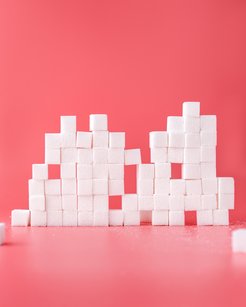Parents Underestimate the Sugar Content of Foods
Overconsumption of sugar: Study examines 305 parent‒child pairs
Almost one-third of the world’s population is overweight, including many children. A study conducted at the Max Planck Institute for Human Development and the University of Mannheim has now shown that most parents seriously underestimate the sugar content of common foods. Alarmingly, the results also show that parental sugar underestimation is associated with a twofold increase in the risk of their children being overweight or obese. The study has been published in International Journal of Obesity.

According to the recommendations of the World Health Organization (WHO), added sugars should not exceed 10 percent of the daily calorie intake of either children or adults. For an average adult, this is the equivalent of about 16 sugar cubes weighing 3 grams each; for children aged 7 to 10 years, it is about 15 sugar cubes. In Germany, the amount of sugar actually consumed is about twice as high. Parents generally make nutritional decisions for their children. But do they know how much sugar there is in common foods and drinks? Mattea Dallacker and Ralph Hertwig from the Max Planck Institute for Human Development and Jutta Mata from the University of Mannheim investigated how accurately parents are able to estimate the sugar content of various foods and beverages. They then examined how those findings related to the children’s Body Mass Index (BMI). A total of 305 parent‒child pairs participated in the study; the children were aged between 6 and 12 years.
The parents completed a computer-based sugar-estimation task. They were shown pictures of six common foods and beverages—orange juice, cola, pizza, yoghurt, granola bars, and ketchup—and asked to estimate the sugar content of each in terms of sugar cubes. The results showed that 74 percent of parents underestimated the sugar content of most items—in some cases, considerably. For example, 92 percent of parents underestimated the sugar content of yoghurt—by on average seven sugar cubes, or 60 percent of the total sugar content of a fruit yoghurt. “Parents tend to think that foods contain far less sugar than is actually the case. We found that to be a potential risk factor for child obesity. The children of parents who underestimated the sugar content were more likely to be overweight,” says Mattea Dallacker, lead author of the study and research scientist in the Center for Adaptive Rationality at the Max Planck Institute for Human Development.
Parents’ estimates were furthest off the mark for products that are generally considered healthy, such as yoghurt and orange juice (84 percent). Only the sugar content of granola bars and ketchup was generally over- rather than underestimated. “It is important that parents as nutritional gatekeepers are aware of the sugar content of foods and beverages. Only then can they keep track of their children’s sugar consumption and offer healthy options. Clear and immediately understandable nutritional labels could help parents to quickly and easily check the sugar content of food products. Examples are the traffic light system—which certainly still has room for improvement—or the Keyhole symbol used in Scandinavia, which identifies products containing less fat, sugar, and salt,” says Ralph Hertwig, Director of the Center for Adaptive Rationality at the Max Planck Institute for Human Development.
Original Publication
Dallacker, M., Hertwig, R., & Mata, J. (2018). Parents’ considerable underestimation of sugar and their child’s risk of overweight. International Journal of Obesity. Advance online publication. doi:10.1038/s41366-018-0021-5












